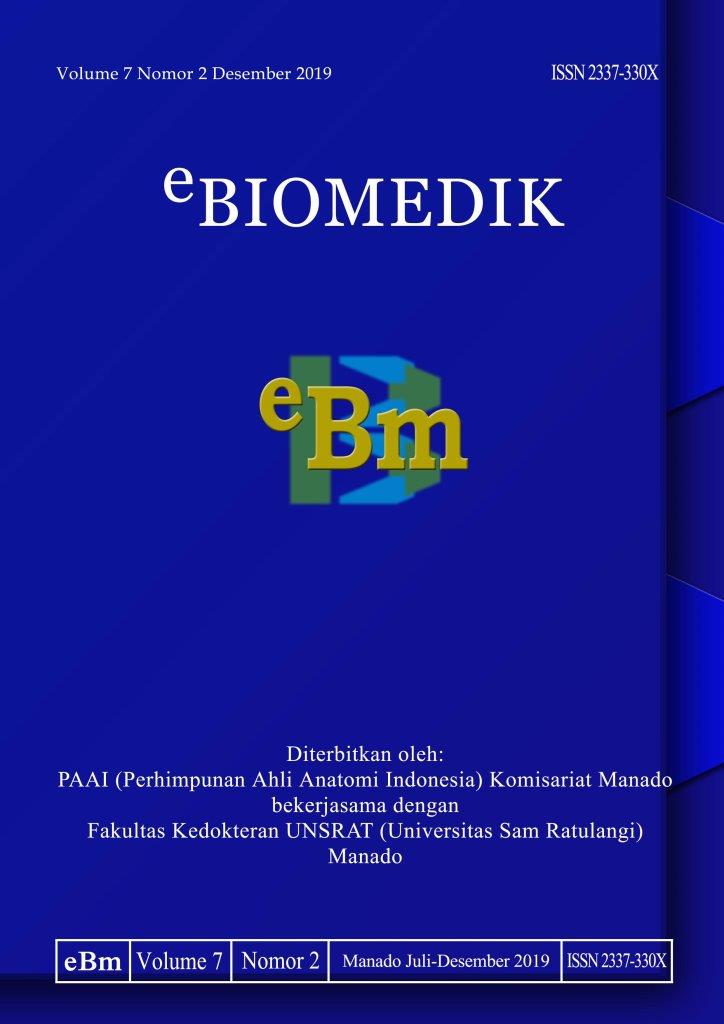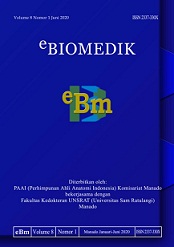Faktor-faktor yang Memengaruhi Kejadian Gastritis di Puskesmas Ranotana Weru Kota Manado
DOI:
https://doi.org/10.35790/ebm.v7i2.24902Abstract
Abstract: Gastrirtis occurs in people who have irregular eating patterns and consume food that stimulates the production of stomach acid. According to WHO, the prevalence of gastritis in several regions in Indonesia is quite high. This study was aimed to evaluate the relationships between diet and gastritis among teenagers at Puskesmas Ranotana Weru, Manado. This was a quantitative study with a cross sectional design. Respondents were teenagers at Puskesmas Ranotana Weru with a total number of 124 respondents obtained by using stratified random sampling method. Data were statistically analyzed by using the chi-squre test. The result of univariate analysis showed that 55% of respondents had gastritis. The results of the chi-square test showed that there were relationships between age and gastritis (p= 0.003); sex and gastritis (p=0.0004); food type and gastritis (p=0.023); and eating pattern and gastritis (p=0.000). Moreover, there were no relationship between meal frequency and gastritis (p=0.165), and between food portion and gastritis (p=0.436). In conclusion, there were significant relationships between age, sex, and food type and the occurence of gastritis. Albeit, there were no relationship between meal frequency and food portion and the occurence of gastritis.
Keywords: gastritis, diet
Abstrak: Penyakit gastritis terjadi pada individu yang memiliki pola makan tidak teratur dan mengonsumsi makanan yang merangsang produksi asam lambung. Menurut WHO, angka kejadian gastritis pada beberapa daerah di Indonesia cukup tinggi. Penelitian ini bertujuan untuk mengetahui hubungan pola makan dengan kejadian gastritis pada remaja di Puskesmas Ranotana Weru, Manado. Jenis penelitian ialah kuantitatif dengan desain potong lintang. Responden penelitian ialah remaja di Puskesmas Ranotana Weru, Manado berjumlah 124 orang yang diambil dengan metode stratified random sampling. Data yang diperoleh dilakukan uji statistik chi-square. Hasil analisis univariat menunjukkan 55% responden menderita gastritis. Analisis bivariat dengan uji chi-square mendapatkan adanya hubungan antar variabel sebagai berikut: antara usia dengan gastritis (p=0,003); jenis kelamin dengan gastritis (p=0,004); jenis makanan dengan gastritis (p=0,023); serta pola makan dengan gastritis (p=0,000). Tidak didapatkan hubungan antara frekuensi makan dengan gastritis (p=0,165), dan antara porsi makan dengan gastritis (p=0,436). Simpulan penelitian ini ialah terdapat hubungan bermakna antara usia, jenis kelamin, dan jenis makanan dengan kejadian gastritis serta tidak terdapat hubungan antara frekuensi makan dan porsi makan dengan kejadian gastritis.
Kata kunci: gastritis, pola makan





